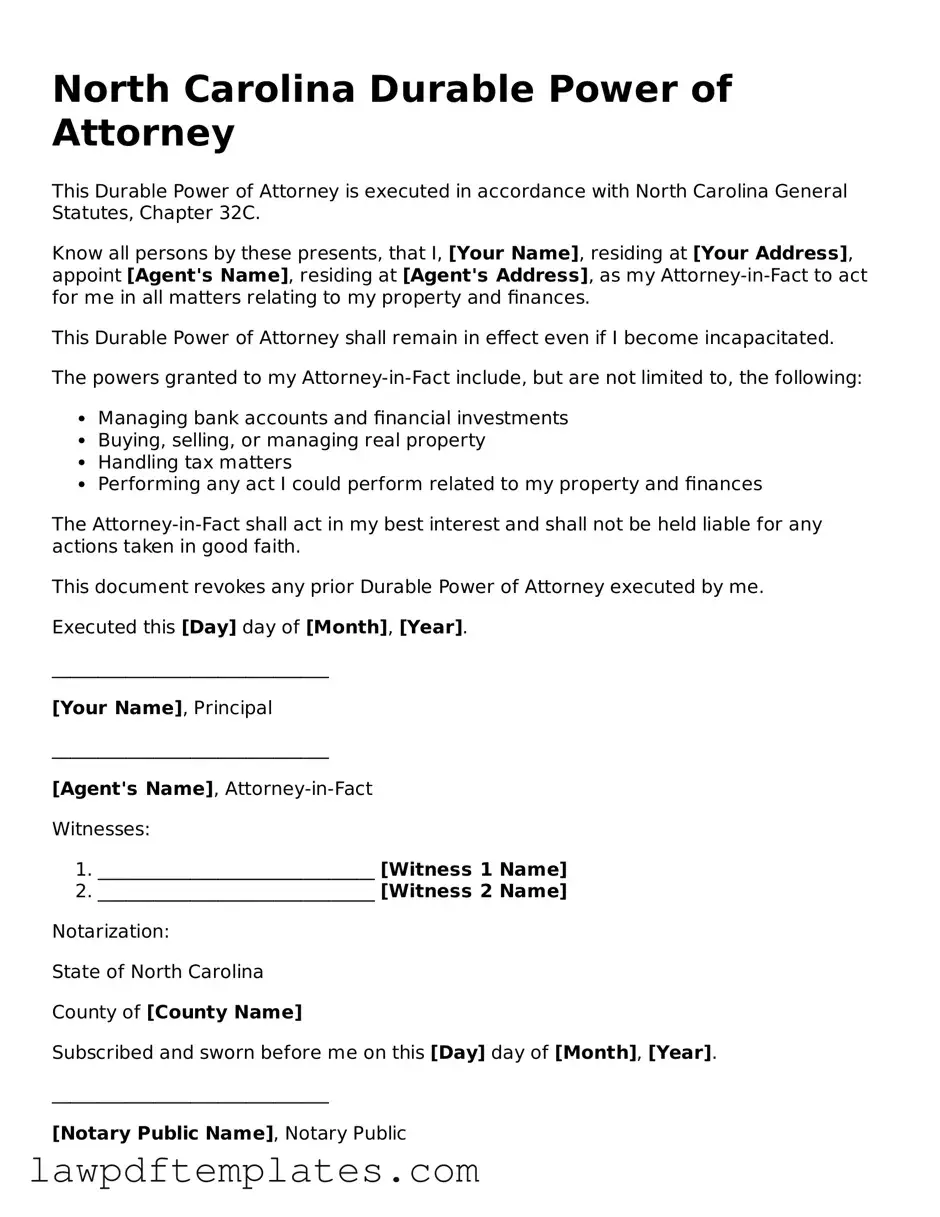Free Durable Power of Attorney Template for the State of North Carolina
Form Breakdown
| Fact Name | Details |
|---|---|
| Definition | A Durable Power of Attorney in North Carolina allows an individual to appoint someone to make financial and legal decisions on their behalf, even if they become incapacitated. |
| Governing Law | The Durable Power of Attorney is governed by North Carolina General Statutes, Chapter 32A. |
| Durability | This document remains effective even if the principal becomes mentally incapacitated, ensuring continuous management of their affairs. |
| Revocation | The principal can revoke the Durable Power of Attorney at any time, as long as they are mentally competent to do so. |
Sample - North Carolina Durable Power of Attorney Form
North Carolina Durable Power of Attorney
This Durable Power of Attorney is executed in accordance with North Carolina General Statutes, Chapter 32C.
Know all persons by these presents, that I, [Your Name], residing at [Your Address], appoint [Agent's Name], residing at [Agent's Address], as my Attorney-in-Fact to act for me in all matters relating to my property and finances.
This Durable Power of Attorney shall remain in effect even if I become incapacitated.
The powers granted to my Attorney-in-Fact include, but are not limited to, the following:
- Managing bank accounts and financial investments
- Buying, selling, or managing real property
- Handling tax matters
- Performing any act I could perform related to my property and finances
The Attorney-in-Fact shall act in my best interest and shall not be held liable for any actions taken in good faith.
This document revokes any prior Durable Power of Attorney executed by me.
Executed this [Day] day of [Month], [Year].
______________________________
[Your Name], Principal
______________________________
[Agent's Name], Attorney-in-Fact
Witnesses:
- ______________________________ [Witness 1 Name]
- ______________________________ [Witness 2 Name]
Notarization:
State of North Carolina
County of [County Name]
Subscribed and sworn before me on this [Day] day of [Month], [Year].
______________________________
[Notary Public Name], Notary Public
Common mistakes
Filling out a Durable Power of Attorney (DPOA) form in North Carolina is a crucial step in ensuring that your financial and medical decisions are managed according to your wishes if you become unable to do so yourself. However, many people make mistakes that can lead to complications down the line. One common mistake is failing to specify the powers granted to the agent. The form allows you to outline specific authorities, such as managing bank accounts or making healthcare decisions. Without clear specifications, your agent may face challenges in executing their responsibilities effectively.
Another frequent error involves not signing the document correctly. In North Carolina, a DPOA must be signed by the principal and witnessed by at least one individual. Some people overlook the witness requirement, believing that their signature alone suffices. This oversight can render the document invalid, leaving your agent without the authority to act on your behalf. Always ensure that you have the necessary witnesses present when signing the form.
Additionally, individuals often neglect to update their DPOA when significant life changes occur. Events such as marriage, divorce, or the death of an agent can impact the effectiveness of your existing document. If you do not revise the DPOA to reflect these changes, it may lead to confusion or disputes regarding who has the authority to act on your behalf. Regularly reviewing and updating your DPOA is essential to ensure it aligns with your current circumstances and intentions.
Lastly, many people fail to discuss their wishes with the appointed agent before completing the DPOA. This conversation is vital. It ensures that the agent understands your preferences and values, which can guide their decision-making in critical situations. Without this dialogue, your agent may be left guessing about your wishes, potentially leading to decisions that do not align with your desires. Taking the time to communicate openly can prevent misunderstandings and ensure that your intentions are honored.
Discover More Durable Power of Attorney Templates for Specific States
Durable Power of Attorney Michigan - A Durable Power of Attorney can be adjusted as life circumstances evolve or change.
When engaging in the purchase or sale of residential property in Texas, familiarity with the Texas TREC Residential Contract form is essential, as it encapsulates all necessary terms and conditions governing the transaction. This form, created by the Texas Real Estate Commission (TREC), helps prevent potential misunderstandings by addressing critical components such as property specifics, financing options, inspections, and closing procedures. To assist in the completion of this important document, you may find further information at texasformspdf.com/fillable-texas-trec-residential-contract-online, ensuring you're fully prepared for a seamless experience.
Power of Attorney Document - You can use this document for both personal and business-related financial decisions.
